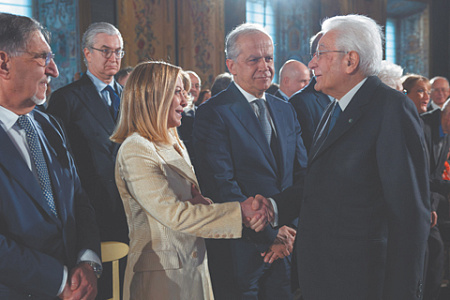
Tensions are escalating at the pinnacle of Italian power, with reported friction between President Sergio Mattarella and Prime Minister Giorgia Meloni. The delicate balance underlying Italy’s republican system has been strained following a recent newspaper exposé suggesting an alleged plot by officials close to the head of state to undermine Meloni’s leadership ahead of the next parliamentary elections.
This revelation prompted a sharp response from the Prime Minister’s allies, who swiftly countered by reiterating their commitment to ambitious constitutional and electoral reforms. These proposed changes are designed to significantly expand the powers of the premiership, potentially reshaping Italy’s governance structure. In an apparent effort to defuse the burgeoning political crisis, both Meloni and Mattarella held a meeting on November 19, subsequently issuing statements affirming the absence of conflict between their respective offices.
The public exchange of veiled threats began when Galeazzo Bignami, leader of the Brothers of Italy faction in the lower house of parliament and a close associate of Meloni, openly discussed the government’s plans for structural changes to the political system. He emphasized these reforms as crucial for improving Italy’s governability by 2026, signaling Meloni’s determination to push through her agenda.
At the core of Meloni’s reform agenda is a significant expansion of the Prime Minister’s mandate. Since assuming office in 2022, Meloni has consistently advocated for a governmental system where the head of government is directly elected by the populace, rather than appointed by the President and vulnerable to parliamentary removal. Her vision aims to tie the Prime Minister’s legitimacy solely to the will of the voters, thereby enhancing governmental stability. Initially, during her campaign, Meloni favored a direct election for the presidency, but later pivoted to advocating for the direct election of the Prime Minister, proposing a two five-year term limit for the position. This push is fueled by Italy’s historically volatile political landscape, where cabinets have averaged a mere 1.5 years in office since 1947.
In tandem with constitutional changes, rumors abound regarding a potential electoral reform. Bloomberg, citing sources, reported on a plan that would introduce a fully proportional system for parliamentary elections, diverging from Italy’s current mixed model. Crucially, this plan also includes a ‘majority bonus’ mechanism, potentially awarding a ruling coalition that secures 40% of the vote up to 55% of parliamentary seats, significantly strengthening its governing capacity.
Not surprisingly, these reform proposals have ignited indignation among opposition parties and are widely seen as a direct challenge to the President’s traditional role, amplifying the risk of a power struggle. The timing of Bignami’s statement was particularly notable, coming just after the Italian newspaper *La Verità* published its controversial report. That article claimed presidential officials were actively plotting against Meloni, basing its allegations on an overheard private conversation involving Francesco Saverio Garofani, a presidential advisor and former parliamentarian from the opposition left-leaning Democratic Party.
Despite the public statements of unity following their November 19 meeting, the path forward for Meloni’s reforms remains uncertain. While her pro-government coalition commands a majority in both parliamentary chambers, making theoretical implementation possible, the Italian constitution is notoriously rigid. Expert Elena Maslova from MGIMO’s Institute of International Studies highlights the historical difficulty of constitutional amendments, noting that past prime ministers, such as Matteo Renzi, have staked their careers on such efforts and failed. Achieving the absolute majority required for constitutional change is a formidable task that few have accomplished. Maslova suggests that such ambitious plans often remain mere declarations.
Maslova further observes that a common thread among Italian politicians is the desire for a more stable leadership position, and Meloni is no exception. Her three-year tenure, already considered lengthy by Italian standards, has faced considerable opposition. This ongoing resistance, coupled with the latest reports of alleged presidential maneuvering, underscores the precarious nature of Meloni’s position and the persistent flux within Italy’s political establishment.
